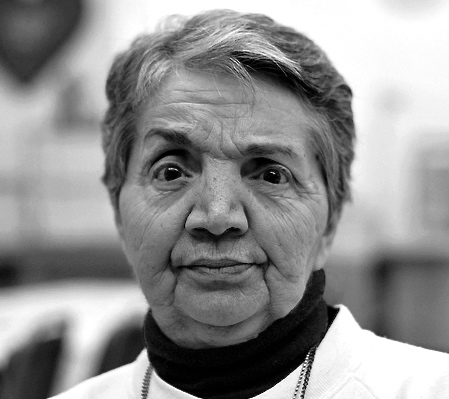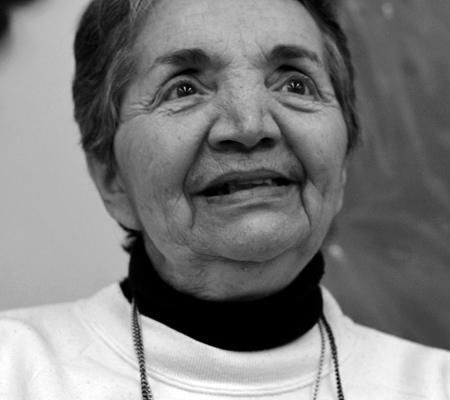Photo by Joshua Kristal
This is the first in a South Brooklyn Post series featuring portraits and interviews with longtime residents of South Brooklyn–Carroll Gardens, Cobble Hill, Boerum Hill, Red Hook and Gowanus. Our bustling corner of Brooklyn isn’t south geographically compared to Coney Island. But for about a century we were known as South Brooklyn. Here are our stories.
 Celia Maniero Cacace is a lifelong resident of South Brooklyn, and she has a thing or two to say to newcomers. Mainly: Curb your “pompissity.â€
Celia Maniero Cacace is a lifelong resident of South Brooklyn, and she has a thing or two to say to newcomers. Mainly: Curb your “pompissity.â€
“Respect us for who we are. Don’t have preconceived ideas about us,†Cacace says, speaking in defense of her fellow natives. To all the “yuppies, guppies and puppies†flooding the hood, she says: “You’re moving to our house. Don’t tell us how to set the table.â€
Cacace, 74, is known as “the mayor†among older, mostly Italian-American residents who hang out at the Eileen Dugan Senior Center, on Court Street, across from Carroll Park. The seniors, many of whom live month-to-month on social security checks, congregate at the center every day for $2 lunches and games of Bingo and cards.
I hung out with Cacace recently at the senior center as she ate lunch: pasta with meat sauce.
The vivacious and well-known senior becomes impassioned when talking about what she sees as the bad attitude of many newcomers, which she says started moving in around the mid-1960s. She recounted conversations in which new residents exhibited demeaning and insulting behavior, a characteristic she calls “pompissity.â€
“Accept what you moved to,†Cacace says. “Judge me after you meet me.â€
 “She speaks for a lot of people,†says Camille Bering, a Carroll Gardens resident who stood watching and listening, with others, as Cacace spoke to me. “She is the voice of the long-term residents.â€
“She speaks for a lot of people,†says Camille Bering, a Carroll Gardens resident who stood watching and listening, with others, as Cacace spoke to me. “She is the voice of the long-term residents.â€
Cacace rents an apartment on First Place but grew up, the 8th of 9 kids, in a small apartment on Rapelye Street, where her family shared two beds and slept “head to toe.â€
Like many at the senior center when I visit, Cacace is a big fan of the name, South Brooklyn Post. She’s got a beef with “Carroll Gardens,†a name coined in the late 1960s by Buddy Scotto, a community leader and owner of Scotto’s Funeral Home, along with other leaders who were trying to renovate the neighborhood and bring investment and renovation here. Back then, brownstones sold for $25,000.
“If you don’t like calling this area South Brooklyn, if you would rather say, ‘Carroll Gardens,’ I’d say, how long have you lived here?†Cacace says. “This was always South Brooklyn. I’m Italian American. I know who I am. Who are you?â€
Growing up, nobody wanted to come to South Brooklyn, because people were afraid of the Italians and Puerto Ricans who lived here, Cacace says.
She leans back and forms her hand like a gun. “Because we’re all mafia, with gold teeth. You scared of me?†she asks. “Sometimes I have to mess with people, and say, ‘Hey, that’s my brother, you scared of him?
“If you were German, would I say, ‘Hail Hitler,’ to you?â€
 When neighborhood leaders started pushing the names Carroll Gardens, Cobble Hill and Boerum Hill, some at that time said they wanted to improve the neighborhood. That was painfully insulting to locals, Cacace said. Newcomers would tell the old-timers not to sit on stoops.
When neighborhood leaders started pushing the names Carroll Gardens, Cobble Hill and Boerum Hill, some at that time said they wanted to improve the neighborhood. That was painfully insulting to locals, Cacace said. Newcomers would tell the old-timers not to sit on stoops.
“You are insulting my mother, my family. We made this neighborhood the way it is. And now you want to come in and change it.
“If I went to Osh Kosh, Missouri, and went in like Loretta Young, with beautiful clothes and a big chiffon dress (Cacace twirls around to demonstrate), you don’t have the class she had under her shoes,†she says. “If I went to Osh Kosh, and everyone was wearing a beehive, do you think I would laugh at their hair?
“You don’t have to be rich to be proper,†Cacace says.
A recent Harris poll showing that people think New Yorkers are rude has Cacace’s blood boiling.
“Whether I do it in the King’s English or Brooklynese, people are too intent on correcting grammar, instead of listening to the soul. If you say, ‘You gotta,’ that means, ‘You have to.’ You gotta listen to what I say.â€
Cacace’s friend, who didn’t want to be quoted, but is also in her 70s and lives on Sackett Street, says she also has felt looked-down-upon by newcomers.
“They’re looking for a place to find,†she says. “We’ve found it.â€
Cacace married in 1960. She says the neighborhood started changing after that. She reminisced about the old days. She grew up in a small apartment, with two beds for 11 people. She remembers it so fondly she drew it out on a piece of paper for me to see.
Kids would sleep on the fire escapes in the summers back then, and go to the “Tar Beach,†on the roofs, to get sun.
Cacace’s mom came here from Italy, like her father, in the 1920s. It was an arranged marriage. “My mother didn’t want to marry. She loved someone else,†Cacace said. “Back then, women didn’t have the rights.â€
Cacace’s mom delivered her ninth baby when she was 51 years old.
“She was a strong lady, ahead of her time,†Cacace says.
“Growing up, I didn’t know we were poor. I was the richest girl in the neighborhood, rich with family.â€
Back then, banks wouldn’t give loans to Italians, Cacace says.
“We were redlined. You couldn’t get a mortgage to buy a house. You couldn’t get insurance for a house or a car.â€
In the 1950s, Cacace’s family had to move to “the hook,†when Robert Moses tore a path through Carroll Gardens with the Brooklyn-Queens Expressway. The BQE path went right through Cacace’s apartment house.
There’s been continual movement since then. It’s hard for many of the older residents who stayed, as they’ve seen families disburse, often because rents and the cost of living is too high, or because homeowners cashed in (and out) on skyrocketing property values.
Cacace’s two sons live out West, and have often asked her to move. She won’t.
“I’m not ready,†she says.
The staff at the center urges everyone out. Lunch is over. As we exit, she looks at me.
“Not all the newcomers are bad. I’ve met some nice ones,†she says.
I ask if she likes any of the changes to Carroll Gardens since all the newcomers started flooding in. Crime has fallen more than 100 percent since then, for instance, and the elementary schools are better than money can buy.
She looks off, to the side. Stares into the distance.
“Hmmmm,†she says. She crinkles her brow.
“Really, nothing?†I ask.
She seems to be honestly contemplating the question.
“Wait five minutes. I have to think on that. I have to separate from the pompissity… ” Cacace says. “I’m sure I’ll think of something.
“Give me a call later, I’ll let you know.â€
